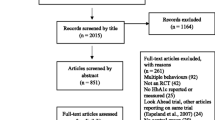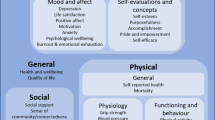Abstract
BACKGROUND: Community-based participatory research (CBPR) approaches that actively engage communities in a study are assumed to lead to relevant findings, trusting relationships, and greater satisfaction with the research process.
OBJECTIVE: To examine community members’ perceptions of trust, benefit, satisfaction, and burden associated with their participation.
DESIGN, SETTING, AND PARTICIPANTS: A randomized controlled trial tested a cancer prevention intervention in members of African-American churches. Data were collected at baseline and 1-year follow-up.
MEASUREMENTS: Subscales measured perception of trust in the research project and the project team, benefit from involvement with the project, satisfaction with the project and the team, and perception of burden associated with participation.
MAIN RESULTS: Overall, we found high levels of trust, perceived benefit, and satisfaction, and low perceived burden among community members in Partnership to Reach African Americans to Increase Smart Eating. In bivariate analyses, participants in the intervention group reported more perceived benefit and trust (P<.05). Participants in smaller churches reported more benefit, satisfaction and trust, while participants from churches without recent health activities perceived greater benefit, greater satisfaction, and lower burden with the project and the team (P<.05). Participants whose pastors had less educational attainment noted higher benefit and satisfaction; those whose pastors were making personal lifestyle changes noted higher benefit and satisfaction, but also reported higher burden (P<.05).
CONCLUSIONS: A randomized clinical trial designed with a CBPR approach was associated with high levels of trust and a perceived benefit of satisfaction with the research process. Understanding variations in responses to a research partnership will be helpful in guiding the design and implementation of future CBPR efforts.
Similar content being viewed by others
References
Institute of Medicine. Committee for the Study of the Future of Public Health, Division of Health Care Services. The Future of Public Health. Washington, DC: National Academy Press; 1988:240.
Green L, Mercer S. Can public health researchers and agencies reconcile the push from funding bodies and the pull from communities? Am J Public Health. 2001;91:1926–9.
Olden K, Guthrie J, Newton S. A bold new direction for environmental health research. Am J Public Health. 2001;91:1964–7.
O’Neill E. Health Professions Education in the Future: Schools in Service to the Nation. San Francisco: Pew Health Professions Commission; 1993.
Gamble V. A legacy of distrust: African Americans and medical research. Am J Prev Med. 1993;9:35–8.
Thomas SB, Quinn SC. The Tuskegee Syphilis Study, 1932 to 1972: implications for HIV education and AIDS risk education programs in the black community. Am J Public Health. 1991;81:1498–505.
Quinn SC. AIDS and the African American woman: the triple burden of race, class, and gender. Health Educ Q. 1993;20:305–20.
Guinan M. Black communities’ belief in “AIDS as genocide”: a barrier to overcome for HIV prevention. Ann Epidemiol. 1993;3: 193–5.
Freedman TG. “Why don’t they come to Pike Street and ask us?”: black American women’s health concerns. Soc Sci Med. 1998;47:941–7.
Corbie-Smith G, Thomas SB, Williams MV, Moody-Ayers S. Attitudes and beliefs of African Americans toward participation in medical research. J Gen Intern Med. 1999;14:537–46.
Corbie-Smith G, Thomas SB, St. George DM. Distrust, race and research. Arch Intern Med. 2002;162:2458–63.
Paskett ED, DeGraffinreid C, Tatum CM, Margitic SE. The recruitment of African-Americans to cancer prevention and control studies. Prev Med. 1996;25:547–53.
Harris Y, Gorelick PB, Samuels P, Bempong I. Why African Americans may not be participating in clinical trials. J Natl Med Assoc. 1996;88:630–4.
Maurana CA, Goldenberg K. A successful academic-community partnership to improve the public’s health. Acad Med. 1996;71:425–31.
Sullivan M, Kone A, Senturia KD, Chrisman NJ, Ciske SJ, Krieger JW. Researcher and researched-community perspectives: toward bridging the gap. Health Educ Behav. 2001;28:130–49.
Lantz PM, Viruell-Fuentes E, Israel BA, Softley D, Guzman R. Can communities and academia work together on public health research? Evaluation results from a community-based participatory research partnership in Detroit. J Urban Health. 2001;78:495–507.
Browne DC, Clubb PA, Aubrecht AM, Jackson M. Minority health risk behaviors: an introduction to research on sexually transmitted diseases, violence, pregnancy prevention and substance use. Matern Child Health J. 2001;5:215–24.
Ammerman AS, Lindquist CH, Lohr KN, Hersey J. The efficacy of behavioral interventions to modify dietary fat and fruit and vegetable intake: a review of the evidence. Prev Med. 2002;35:25–41.
Eng E, Hatch J, Callan A. Institutionalizing social support through the church and into the community. Health Educ Q. 1985;12:81–92.
Israel BA, Schulz AJ, Parker EA, Becker AB. Review of community-based research: assessing partnership approaches to improve public health. Annu Rev Public Health. 1998;19:173–202.
Wallerstein N, Bernstein E. Introduction to community empowerment, participatory education, and health. Health Educ Q. 1994;21:141–8.
Thomas SB, Quinn SC, Billingsley A, Caldwell C. The characteristics of northern black churches with community health outreach programs. Am J Public Health. 1994;84:575–9.
Campbell MK, Motsinger BM, Ingram A, et al. The North Carolina Black Churches United for Better Health Project: intervention and process evaluation. Health Educ Behav. 2000;27:241–53.
Derose KP, Hawes-Dawson J, Fox SA, Maldonado N, Tatum A, Kington R. Dealing with diversity: recruiting churches and women for a randomized trial of mammography promotion. Health Educ Behav. 2000;27:632–48.
Author information
Authors and Affiliations
Additional information
This work was supported by grants from the National Institutes of Health (R01 CA73981, R01 CA73981-50651, and K01 HL04039), and the Robert Wood Johnson Minority Medical Faculty Development Award.
Rights and permissions
About this article
Cite this article
Corbie-Smith, G., Ammerman, A.S., Katz, M.L. et al. Trust, benefit, satisfaction, and burden. J GEN INTERN MED 18, 531–541 (2003). https://doi.org/10.1046/j.1525-1497.2003.21061.x
Issue Date:
DOI: https://doi.org/10.1046/j.1525-1497.2003.21061.x




